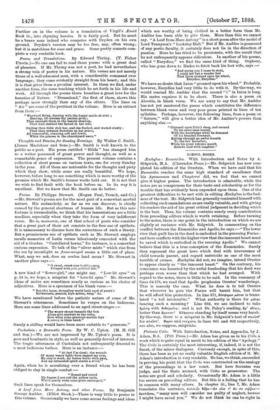SCHOOL BOOKS.
pleted his edition of the Oresteia. When we have said that his
Eumenides reaches the same high standard of excellence that his Agamtermon and Chcaphoroi did, we feel that we cannot give it higher praise. The introduction is admirable, while the notes are as conspicuous for their taste and scholarship as for the trouble that has evidently been expended upon them. One of the greatest difficulties to be met with in editing .2Eschylus is the bad- ness of the text. Mr. Sidgwick has generally contented himself with collecting such emendations as are really valuable, and with giving his readers the aid of his great critical judgment in deciding which is the best. Thus, his volume contains nearly every contribution from preceding editors which is worth retaining. Before turning to the notes, there is one point in the introduction on which we are slightly at variance with Mr. Sidgwick. In commenting on the conflict between the Eumenides and Apollo, he says :—" The lower view that guilt lies in the deed is embodied in the pursuing Furies : and here conflicts with the higher view that the innocent heart must be saved which is embodied in the rescuing Apollo." We cannot believe that this is a true conception of the Eumenides. Surely they represent the great laws which deal with irreverence of child towards parent, and regard matricide as one of the most terrible of crimes. /Eschylus did not, we imagine, intend Orestes to appear clearly as "the innocent heart." On the contrary, his conscience was haunted by the awful foreboding that his deed was perhaps even worse than that which he had avenged. With regard to the notes, there is little to be said. In the summary of lines 64-178, we read that Apollo prophesies Orestes' wanderings. This is scarcely the case. What he does is to tell Orestes that wherever he goes the Furies will haunt him, but that he will afford him protection. In line 371, atrcpopov adrav is trans- lated "a toil intolerable." What authority is there for pane, bearing such a meaning ? Line 632, we are inclined to take Sporre with SeBryizbm : and is not Dr. Paley's reading, shims, better than ,g-etvov? Elicppocnv standing by itself seems very harsh. By-the-way, there is a misprint in Mr. Sidgwick's text of irAeicrir for witeicrT'. BapDv and Tel/xi/ye, in lines 801 and 802 respectively, are also, we suppose, misprints.






































 Previous page
Previous page